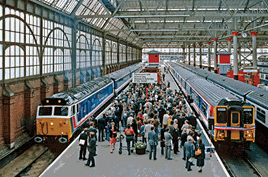Launch strategy
The date was finally set for the launch of Network SouthEast. It was to be June 10 1986 - a date that is still affectionately remembered today by those involved. It was also to create the most concentrated workload that it was possible to cram into six months.
The new MD, Chris Green, insisted that the early announcements should be about quality improvements, and the first public statement came on February 12 when he announced that “we are launching an all-out drive to improve the quality of service for commuters in London and the South East under the slogan ‘Operation Pride’.”
He also revealed the injection of an additional £10 million funding into quality projects, to show that he meant business.
Political support
The new Minister of Transport, David Mitchell, was concerned by the growing criticisms reaching him from dissatisfied London commuters. He appreciated that the huge reduction in L&SE subsidy over the previous three years had impacted on performance quality, and he proved supportive of ‘Operation Pride,’ giving the new sector strong public support for its quality initiatives.
The media
The bigger challenge was how to get the media - national and regional - on side before the relaunch. The Evening Standard had made common cause with its commuter readers and had created a Commuters’ Club, which reinforced an ‘Isn’t it terrible?’ culture. A typical article in early 1986 read: “Rush hour travel for more than 400,000 people is a daily purgatory of grossly overcrowded trains … grimy carriages, shabby furnishings and ancient rolling stock.”
Chris realised in his first few weeks that The Standard was going to be the key to a successful relaunch in the South East. So he did the only thing possible and asked to meet its editor, Louis Kirby. The meeting was a success. Chris explained that, as the newcomer, he needed a period of support to improve the product and re-motivate the staff.
The Evening Standard offered a truce while the new NSE team raised its game. It went further, and also offered positive support through profile interviews in which Chris would explain his plans, and would encourage a more informed debate with its readers. The Standard’s subsequent endorsement of ‘Operation Pride’ was positive, and was immensely helpful in getting the message across to commuters that improvements were on the way.
In turn, Network SouthEast recognised the paper’s support by inviting its editor to name the first NSE-branded locomotive The London Standard, before using the paper for a major advertising campaign from June, when quality had finally started to improve.
‘Operation Pride’
Chris was also quite open with the media about his own commuting experiences. A Times profile on May 9 revealed the extensive travelling that the new managing director had been making to different overnight destinations, and stated that his mission was to “restore the quality of service standards”. It also shared his concern that L&SE’s achievement in cutting over a third off the taxpayer’s subsidy had left the sector rather ragged in the quality of its delivery.
‘Operation Pride’ became a landmark in creating a common cause between railway, commuters, politicians and media. The Evening Standard published the quality standards at the start of ‘Operation Pride’, together with the current levels of achievement. Commuters were given two-monthly updates on the improvements thereafter, while the Standard wished NSE well in its crusade to raise customer quality.
This public support also proved critical in helping NSE to get the extra £10m of funding that it needed to get ‘Operation Pride’ kick-started.
Finance and quality were finally linked. NSE was now able to ‘walk the talk’ and commit to the recruitment of 1,700 extra staff to fill the vacancies for train crew, booking offices, cleaners and telephone enquiry bureaux. The public evidence of change was to be cleaner trains and stations - backed by an accelerated painting programme for 250 stations each year.
Letters from MPs gradually changed, from grumbling about performance to campaigning for their local stations to be modernised first - complete with high-profile opening ceremonies.














Comment as guest
Comments
No comments have been made yet.